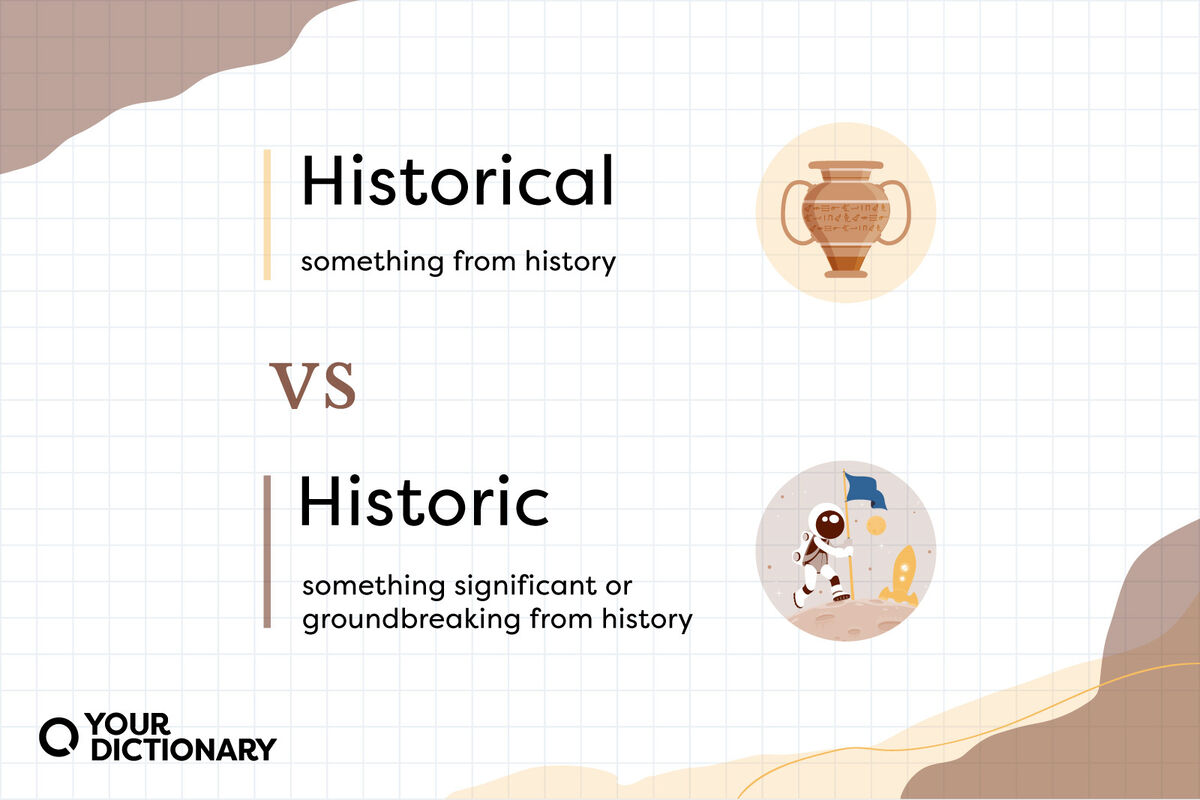
Historic and historical are both adjectives that mean “from history” — but they’re not synonyms. Historical refers to “something from history,” and can describe anything from years gone by. However, historic only refers to very important or impactful events or objects. The difference between historic vs. historical becomes more clear when you know exactly what you’re describing.
When To Use ‘Historical’
The adjective historical (pronounced his-TOR-ik-al) describes something from history, regardless of its significance. It comes from the Greek historikos, meaning “from history,” and uses both the suffixes -ic and -al.
You’ll see it before nouns that are from history (such as “historical figures” or “historical artifacts”), or before nouns that discuss history (such as “historical fiction” or “historical records”).
Example Sentences: Proper Usage of ‘Historical’
Historical appears in sentences that discuss something that took place in the past, but that would not be described as a historic (momentous) occasion. For example:
- Meteorologists study historical data about past weather events to help forecast future conditions.
- Our class will tour historical battlefields on our next field trip.
- You can find the transcripts of many historical speeches in the library.
- The Lenox Library in New York City is a beautiful and important historical building.
- Lea enjoys reading historical romance novels.
When To Use ‘Historic’
A historic (pronounced his-TOR-ik) event is a noteworthy moment or item from history. It can also refer to current events that will make history (as in “On this historic occasion …”). Historic events are more significant than historical events.
Both historic and historical have appeared in English for centuries. However, as they are common words in literature and historical writing, their modern definitions have become more clear cut.
Example Sentences: Proper Usage of ‘Historic’
When describing a momentous or significant event or accomplishment, use historic. For example:
- Hurricane Katrina was a historic storm that permanently altered New Orleans, Louisiana and the Mississippi Gulf Coast.
- The historic attack on Pearl Harbor represented a turning point in World War II.
- Martin Luther King's historic 1963 I Have a Dream speech at the Lincoln Memorial marked a turning point in the Civil Rights Movement.
- Amelia Earhart's solo flight across the Atlantic was a historic achievement for women and the aviation industry.
- The moment Neil Amstrong took his first step on the surface of the moon was a historic occasion for all of mankind.
- In the historic Brown v. Board of Education decision, the Supreme Court of the United States ruled to end racial segregation in public schools.
Should You Use ‘A’ or ‘An’ Beforehand?
Because both historic and historical begin with a consonant, you should use the article “a,” correct? Grammatically, that is true — but for many people, “an historic event” sounds better than “a historic event.” And there are other words that start with “h” but use “an,” such as “an honor” or “an hour.”
But the “h” in those words is silent, making the /o/ sound the first sound of the word. Similarly, historic and historical used to be pronounced without the “h” as “istoric” and “istorical” (and in some British dialects, that’s still the case) ” If you say “an istoric event,” it sounds correct. However, most American dialects pronounce both words with a hard “h” sound, making “a” the correct article to use. If it still sounds incorrect, you can always rephrase or use “the” instead.